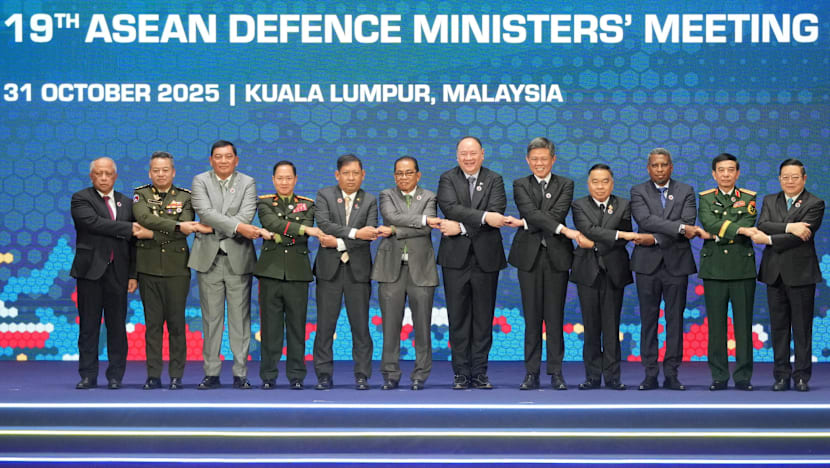World
ASEAN Strengthens Defence Cooperation Amid Regional Tensions

The Association of Southeast Asian Nations (ASEAN) has reinforced its commitment to unity and enhanced regional defence cooperation during a recent meeting of defence ministers in Kuala Lumpur. In a joint statement, the bloc highlighted its dedication to upholding international law and fostering stability through collaborative efforts. The gathering also featured defence chiefs from major global powers, including the United States, China, and India, reflecting heightened international interest in security dynamics within the region.
Exploring New Areas of Cooperation
During the meeting, delegates discussed new avenues for cooperation, particularly in areas such as cyber defence, artificial intelligence, and disaster response. A significant focus was placed on the South China Sea, a longstanding flashpoint due to overlapping territorial claims among several nations. Defence leaders expressed renewed hopes of finalising a long-discussed code of conduct to regulate activities in these disputed waters. The Philippines, which has taken over the ASEAN chairmanship from Malaysia, has indicated that establishing this framework will be a top priority for its tenure.
On the sidelines of the meeting, the Philippines and the United States announced the formation of a new military task force aimed at strengthening military readiness in the South China Sea. This initiative comes amid rising tensions, with China asserting claims over vast portions of the sea that overlap with territories claimed by four Southeast Asian nations: Malaysia, Brunei, the Philippines, and Vietnam. Frequent confrontations have occurred between Philippine and Chinese vessels, particularly around the Spratly Islands.
Philippine Defence Secretary Gilbert Teodoro emphasised the importance of respect for global norms, stating that adherence to international maritime law should not depend on a nation’s size or influence. He remarked, “This should not be bipolar balanced power. It should be exercised, but by all countries, whether big or small – with agency.” He called for cooperation among all nations under a clear and transparent set of rules.
Military Spending and Regional Stability
Teodoro also indicated that the Philippines plans to gradually increase its defence spending, which currently stands at 1.2 percent of its GDP as of 2023, according to the World Bank Group. He noted that his goal is to model the defence budget on New Zealand’s approach, which aims to reach 2 percent of GDP over the next eight years. Analysts have described the Philippines’ current defence expenditure as relatively modest given its strategic vulnerabilities.
In contrast, Malaysia’s Defence Minister Mohamed Khaled Nordin expressed satisfaction with his nation’s current military budget, which continues to grow annually. He stated, “We believe that whatever that we procure (for defence spending) is more of a deterrent.” Malaysia’s defence allocation is set to rise to US$5 billion in 2026, marking a 2.9 percent increase from this year, as part of ongoing efforts to modernise its armed forces.
Khaled highlighted that ASEAN has made considerable strides in promoting peace across the region. The bloc has deployed an observer team to monitor the ceasefire along the Thai-Cambodia border following a joint peace declaration at the ASEAN summit. Additionally, Malaysia has signed a defence cooperation agreement with Timor-Leste to bolster the military capabilities of ASEAN’s newest member and facilitate its participation in regional exercises.
Khaled underscored the necessity for ASEAN to unite in addressing external challenges and maintaining collective strength. He stated, “There are many challenges that ASEAN faces from the outside. There are efforts to try and woo ASEAN countries to take sides.” He believes that a cohesive ASEAN will command respect, enabling the bloc to secure peace, stability, and security in the region.
While ASEAN leaders advocate for greater self-reliance in defence, analysts note that the bloc’s strength lies in forging partnerships and maintaining a balance between major powers. Adib Zalkapli, managing director of Viewfinder Global Affairs, remarked, “Most countries in ASEAN do not have the defensive ability to match the major powers. So, alliance partnership is necessary as some kind of security guarantee or not losing autonomy.” He suggested that the optimal approach for ASEAN is to balance cooperation with the US while exploring enhanced collaboration with other major powers.
As tensions persist in the region, the outcomes of this meeting signal ASEAN’s determination to navigate complex geopolitical dynamics while fostering unity and cooperation among its member states.
-

 Lifestyle3 months ago
Lifestyle3 months agoHumanism Camp Engages 250 Youths in Summer Fest 2025
-

 Sports3 months ago
Sports3 months agoDe Minaur Triumphs at Washington Open After Thrilling Comeback
-

 Business4 months ago
Business4 months agoKenvue Dismisses CEO Thibaut Mongon as Strategic Review Advances
-

 Sports4 months ago
Sports4 months agoTupou and Daugunu Join First Nations Squad for Lions Clash
-

 Top Stories4 months ago
Top Stories4 months agoColombian Senator Miguel Uribe Shows Signs of Recovery After Attack
-

 World4 months ago
World4 months agoASEAN Gears Up for Historic Joint Meeting of Foreign and Economic Ministers
-

 Business4 months ago
Business4 months agoOil Prices Surge Following New EU Sanctions on Russia
-

 Health3 months ago
Health3 months agoNew Study Challenges Assumptions About Aging and Inflammation
-

 Entertainment3 months ago
Entertainment3 months agoDetaşe-Sabah Violin Ensemble Captivates at Gabala Music Festival
-

 Entertainment3 months ago
Entertainment3 months agoBaku Metro Extends Hours for Justin Timberlake Concert
-

 Business4 months ago
Business4 months agoU.S. House Approves Stablecoin Bill, Sends to Trump for Signature
-

 Top Stories4 months ago
Top Stories4 months agoRethinking Singapore’s F&B Regulations Amid Business Closures









